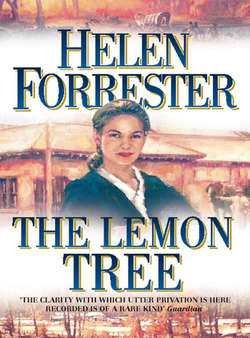Читать книгу The Lemon Tree - Helen Forrester - Страница 9
Chapter Five
ОглавлениеThe two rooms above Charles Al-Khoury’s shop in Chicago were occupied by Polish immigrants. When they moved out, he again bargained with his Greek landlord and succeeded in renting the rooms for little more than he was already paying for the shop. Triumphantly, he got Sally to clean the rooms and then he installed his wife and daughter in them.
The tiny store and the flat above it became Helena’s world.
She carried samples of materials to the houses of well-to-do ladies, when requested; and in the shop she made tea for women who began to discover the fine quality of Charles’s stock. They sat by his counter and talked haughtily to him, under the impression that they were bargaining successfully for a better price than others obtained; dressmakers, who also came, always got materials at a better price, but they always received a lower grade silk. As her father warned her, ‘Dressmakers are always poor; you can’t get more money out of them than they have. Remember that!’
Helena was allowed to handle swatches from the fat bales on the shelves, and she soon learned what constituted a good dress length. Her English rapidly became better than his, so he encouraged her to write his business letters for him and then to keep the accounts. Though she did not write her father’s letters in Arabic to Uncle James, she sometimes saw them. It was apparent that her father felt that Uncle James was quite mad; he was boiling soap in his landlady’s wash boiler and was selling it door-to-door in Liverpool.
The bales of material were heavy, and Charles lifted them himself. Helena watched with anxiety the sweat pour down his face, as he moved the cotton-swathed rolls from shelf to counter to show them to customers, and, later, lifted them back onto the shelf.
One day, when he had gone with swatches of material to see a particularly high-class dressmaker and Helena was watching the shop for him, Sally remarked to her, ‘Your pa’s doing too much.’ She was polishing the old wooden counter to a fine sheen, as she spoke, and did not appear to expect a reply.
Helena’s heart seemed to miss a beat, as the implied threat of illness sank in. From then on, she insisted that she be allowed to help with the tidying-up of the shop, but she was a skinny youngster without much power in her arms; and he would laugh and take the bundles from her to lay them on the shelves.
Apart from his stock, American women found the Lebanese shopkeeper charming and they recommended the store to their friends. The tiny business began to prosper. The Al-Khourys hoarded every cent they could.
At the end of six months, Charles insisted that his wife give up her job with the tailor and stay at home. ‘If we are very, very careful, we can manage,’ he assured her. ‘I don’t like you doing menial work.’
Helena took her mother for granted; she did not realize that she possessed unusual beauty, and that, as she learned to dress in Western clothes, her father felt jealous when other men looked at her. He wanted her at home, not veiled like a Muslim woman but decently bundled up like a good Maronite.
Leila Al-Khoury was thankful to be released from the tailor’s stuffy attic, but she refused to wear her native dress or veil her hair. She had fallen in love with hats and bought herself a plain black straw which she trimmed with shreds of silk from her husband’s shop.
With this imaginative concoction on her head, she pressed herself lovingly against her husband and assured him that he had nothing to worry about. He was partially mollified, though the flowerlike face framed by the hat’s brim was, he felt uneasily, very attractive.
Helena had not inherited her mother’s beauty. Though she was not ugly, she had her father’s strong nose and wide mouth. She was sallower than Leila and there was no hint of pink in her cheeks; and her long oriental eyes with their secretive, sidelong glances were too foreign for Western taste. The tumbling black mass of her hair was restrained in a bun at the back of her head and gave little hint of its richness. Amid the babble of thousands of immigrants, as a skinny young girl she passed unremarked. Until she met Joe Black.
Curled up alone in a feather bed in Liverpool, her dream passed from the nightmares of the Lebanon and Chicago, to Joe.
She smiled in her sleep, as she seemed to hear herself saying to him cryptically, ‘You never gave me toffee apples.’ And his laughing back at her and saying, ‘I never thought of them. Want one?’
Joe had his own ideas of gifts. In her dream, she saw him lounge into their living-room, the original log cabin in which her stepfather had first lived in Canada. Peeking out of his jacket was a tame grey fox, a birthday gift.
One Christmas, he had brought her a muff made from a marten fur he had trapped; his mother had cleaned and tanned the skin and he had then given it to another Cree woman who had fashioned it for him. Sometimes, when he had been south to see his grandfather, he brought her a little opium to smoke, bargained from a lonely Russian farmer who had established his own patch of poppies, or, at other times, a small packet of tobacco from Virginia, passed from hand to hand across a continent, in trade.
The rising sun began to push long fingers between the heavy velvet curtains of her bedroom in Liverpool, and she sleepily stretched out to touch him. But he was six thousand miles away, harvesting a hay crop.
